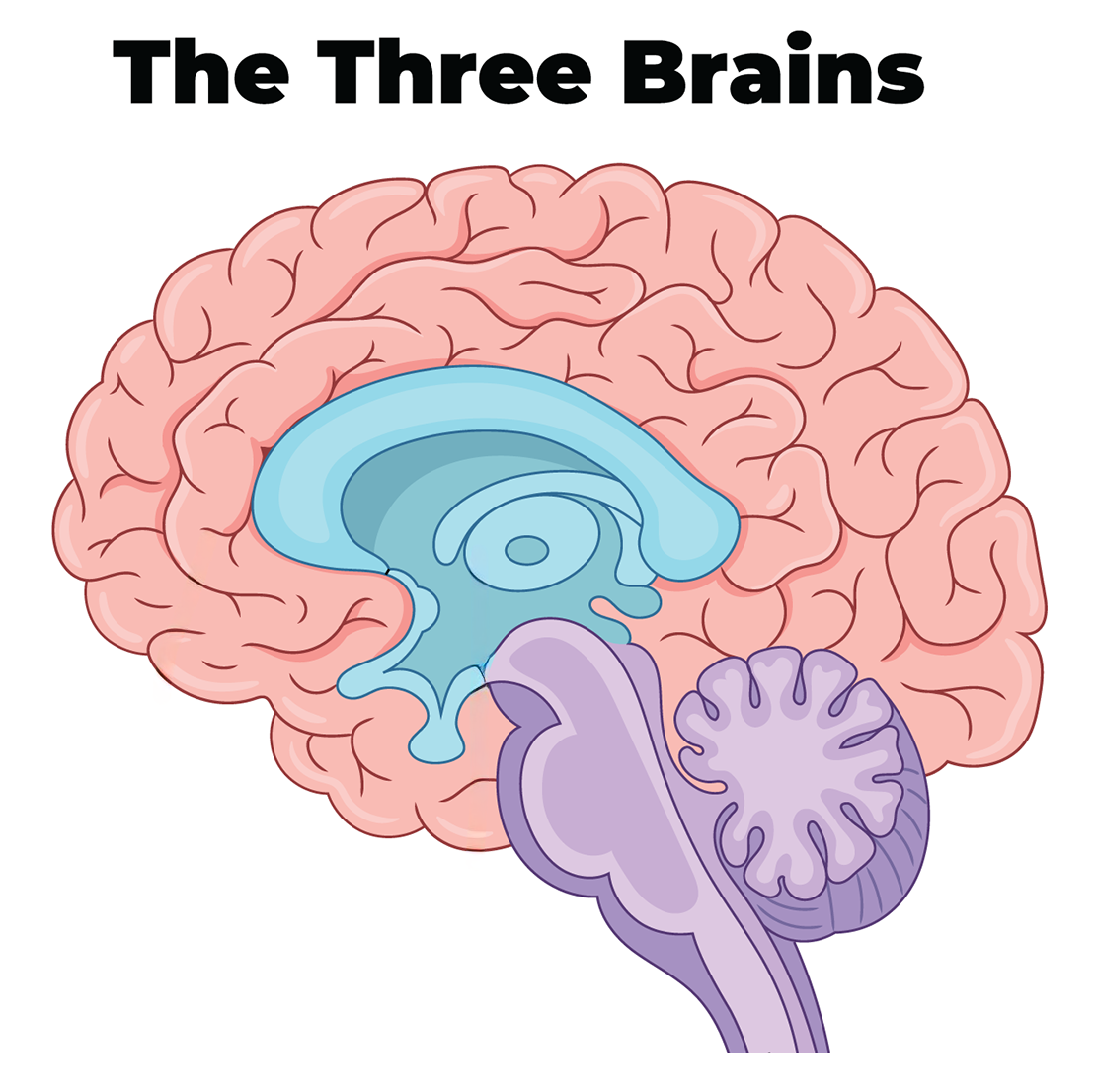The Brain’s Epic Journey

Your prehistoric operating system
Your brain’s prehistoric operating system is trying to run a high-tech life. Three layers often throw a digital tantrum. Cue stress spirals, social media black holes, and the eternal “I’ll do it tomorrow.” But here’s the secret: understanding your brain’s caveman quirks is like finding the remote control to your own personal chaos.
The Brain’s Epic Journey:
Ancient Software in a Modern World
Have you ever wondered why you can solve complex problems at work but still panic before a presentation? Or why you find yourself endlessly scrolling through social media even when you have important tasks waiting? The answer lies in understanding the brain’s epic journey.
Your Internal Operating Systems
Your brain isn’t just a single unit—it’s a sophisticated technological marvel built in three evolutionary layers, each with its own programming and priorities:
The Reptilian Brain: Your Survival Wizard
This is your 24/7 emergency response team, the oldest part of your brain that’s remained essentially unchanged for millions of years. It doesn’t think; it reacts. Its sole purpose is to keep you alive by regulating:
- Breathing
- Heart rate
- Body temperature
- Fight-or-flight response
That moment when you jump at a sudden loud noise or feel your heart racing before an important meeting? That’s your reptilian brain working overtime, unable to distinguish between a real threat (like a predator) and a perceived one (like public speaking).
The Mammalian Brain: Your Emotional Powerhouse
Think of this as your internal drama director. It’s responsible for:
- Generating emotional responses
- Forming memories
- Driving social connections
- Basic learning processes
Those intense emotions, unexpected mood shifts, and deep connections with loved ones that feel so important? That’s your limbic system in full swing. It’s also why social media can feel so overwhelming—it taps directly into this emotional processing center, amplifying both the highs and lows.
The Human Brain: Your Cognitive Superhero
This is your personal supercomputer—the newest and most advanced layer that makes us uniquely human:
- Abstract reasoning
- Problem-solving
- Language processing
- Advanced decision-making
This sophisticated part of your brain enables you to plan for the future, understand complex concepts, and develop innovative solutions to challenges.
When Ancient Software Meets Modern Life
Your brain is running software that was perfected for a world that no longer exists. Here’s how this plays out in everyday situations:
Brain Overload
What’s happening: Everything feels overwhelming—work deadlines, family responsibilities, financial decisions, constant notifications.
The brain story: Your threat detection system is in overdrive, and your emotional brain is amplifying everything.
Quick fix: Find a quiet space, focus on one task at a time, and try the 5-4-3-2-1 grounding technique (identify 5 things you can see, 4 you can touch, 3 you can hear, 2 you can smell, and 1 you can taste).
Scroll Stuck
What’s happening: You can’t stop checking your phone, even when you want to be present with friends or family.
The brain story: Your reward system is hooked on the dopamine hits from notifications and likes.
Break free: Put your phone in another room during important activities, turn off non-essential notifications, and set specific times for social media checks.
Emotion Explosion
What’s happening: Your feelings are intensified, and everyday setbacks feel catastrophic.
The brain story: Your limbic system can sometimes overpower your rational thinking.
Calm the storm: Name the emotion (just labelling it helps), talk to someone you trust before reacting, and remember—this feeling WILL pass.
Procrastination Station
What’s happening: You know you need to do something important, but your brain keeps saying “later.”
The brain story: Your ancient brain avoids tasks that seem threatening or unclear.
Get moving: Start with something ridiculously small, set a timer for just 10 minutes, and make tasks clear and specific.
Your Brain’s Superpowers
These challenges might seem overwhelming, but they come from the same adaptations that give your brain its incredible abilities:
- Pattern Recognition: Your brain can identify potential threats in milliseconds
- Social Intelligence: You can read facial expressions and understand complex social dynamics
- Neuroplasticity: Your brain rebuilds itself with every new skill and experience
- Imagination: You can envision different futures and create innovative solutions
Working With Your Brain, Not Against It
Consider these real-life success stories:
- Sophie learned to recognise her brain’s alarm system before important presentations. Three deep breaths and a reality check—”I’m not in danger, it’s just a meeting”—helped her perform better.
- Adrian broke free from his social media addiction by understanding why digital validation felt so important to his ancient brain.
- Elena stopped abandoning new hobbies by celebrating tiny wins instead of expecting overnight success.
The Bottom Line
Your brain isn’t just some lump of tissue—it’s the masterpiece of evolution. Think about it: this one and a half kilo wonder between your ears is what got our ancestors through ice ages, predator attacks, and countless disasters. It’s what let them figure out fire, agriculture, and eventually smartphones and space travel.
Look, we all have those moments—stressing over deadlines, overthinking conversations, doom-scrolling at 2 AM. In those moments, your brain seems like it’s deliberately sabotaging you. But here’s the thing: those same “annoying” features are what kept your ancestors alive long enough to have kids who eventually had you.
When you get why your brain does what it does—why rejection feels physically painful or why uncertainty makes you anxious—you suddenly have options. Instead of fighting your brain’s hardwiring, you can work with it. That’s not just a cool scientific insight; it’s freedom. It’s the difference between being driven by invisible forces and actually taking the wheel.
Your move.
What brain battle are you facing right now? Share in the comments how you’re working with your brain rather than against it!

0 Comments